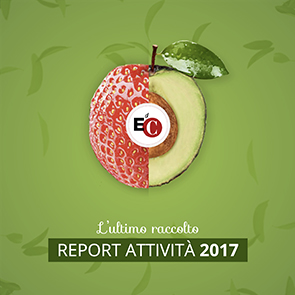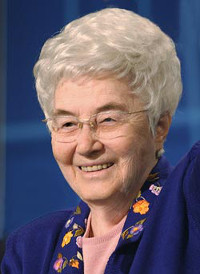Three days of meetings and reflections promoted by the Focolare Movement and by many other realities committed to building a more just future for the world.
Published in La Difesa del Popolo on 18/11/2018
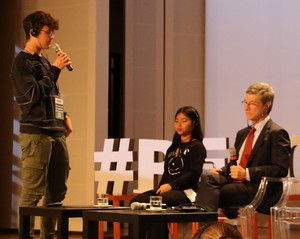 «Ciao, Jeff!» That is how Luigi, perhaps 14 years old, opened his dialogue with the famous Jeffrey Sachs, professor at Columbia University in New York and consultant to the United Nations. The professor is in the game: «Ciao, Luigi!». He has just finished a passionate talk on the 17 objectives of sustainable development as the guest of honour of “Prophetic economy”.
«Ciao, Jeff!» That is how Luigi, perhaps 14 years old, opened his dialogue with the famous Jeffrey Sachs, professor at Columbia University in New York and consultant to the United Nations. The professor is in the game: «Ciao, Luigi!». He has just finished a passionate talk on the 17 objectives of sustainable development as the guest of honour of “Prophetic economy”.
The event is unusual not only in its title and not just for those people of various ages in white protective clothes who are being busy on stage around a large canvas that on the third day will have become a colourful image of people moving.
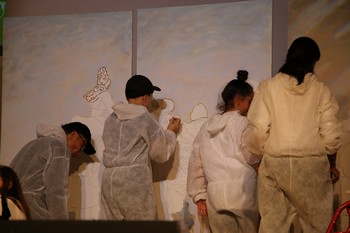 Sachs, one of the most authoritative voices among those who believe in the importance of international aid, proposes a great reorientation of resources to respond to the most pressing problems of the planet. He cites the teaching of the popes, from Populorum Progressio of Paul VI to Laudato si’ of Francis several times and with great appreciation, despite being Jewish by religion.
Sachs, one of the most authoritative voices among those who believe in the importance of international aid, proposes a great reorientation of resources to respond to the most pressing problems of the planet. He cites the teaching of the popes, from Populorum Progressio of Paul VI to Laudato si’ of Francis several times and with great appreciation, despite being Jewish by religion.
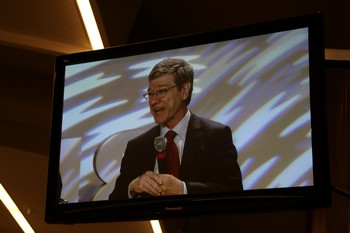 In the audience there are some 600 people listening to him, including many young ones eager to move from the cultural programme to the noisier and more engaging workshops that follow. But the questions of the adolescents sitting around him arouse new interest. "As a young boy, were you interested in the economy?” "I didn't even know what it was, but visiting countries that were very different from mine, I began to ask myself why.”
In the audience there are some 600 people listening to him, including many young ones eager to move from the cultural programme to the noisier and more engaging workshops that follow. But the questions of the adolescents sitting around him arouse new interest. "As a young boy, were you interested in the economy?” "I didn't even know what it was, but visiting countries that were very different from mine, I began to ask myself why.”
The most demanding question arrives from Luigi himself: "Can we change this system that is destroying the environment and is creating so much inequality?” Sachs recognizes the distortions of the system and the phenomena of corruption and illegality that lurk within it and he trusts in the spread of a different economic culture that replaces individual greed with mutual trust, 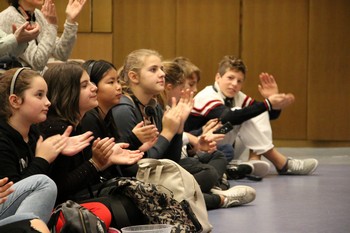 "...in the line of the Italian tradition of Civil Economy - he takes the opportunity to underline - that characterizes you". Here he mentions the names of Luigino Bruni, Stefano Zamagni and Leonardo Becchetti, all of whom are involved in these three days in various ways. The event was held from 2 to 4 November in Castel Gandolfo, in the former hall of papal audiences transformed into a conference centre by the Focolare Movement.
"...in the line of the Italian tradition of Civil Economy - he takes the opportunity to underline - that characterizes you". Here he mentions the names of Luigino Bruni, Stefano Zamagni and Leonardo Becchetti, all of whom are involved in these three days in various ways. The event was held from 2 to 4 November in Castel Gandolfo, in the former hall of papal audiences transformed into a conference centre by the Focolare Movement.
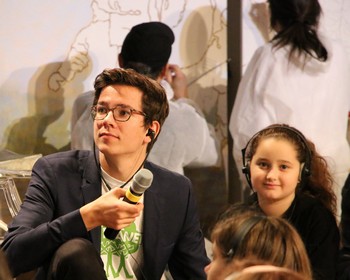 During the conference the voices of supporters and operators of grass-root initiatives, starting from local resources and communities were also heard. No less interesting, and addressing the youngest ones, is the voice of Felix Finkbeiner, founder and president of Plant for the planet. Since 2008 he has planted 15 billion trees on all continents to absorb carbon dioxide and protect the land, and aims to get to one trillion. How old is Felix, you ask? Twenty-one! Carlo Petrini’s age is more than three times as much: he is a tranquil Italian champion of good food and healthy agriculture linked to traditions. A warm appeal to an economy concerned about the environment and global warming came from Petrini, too.
During the conference the voices of supporters and operators of grass-root initiatives, starting from local resources and communities were also heard. No less interesting, and addressing the youngest ones, is the voice of Felix Finkbeiner, founder and president of Plant for the planet. Since 2008 he has planted 15 billion trees on all continents to absorb carbon dioxide and protect the land, and aims to get to one trillion. How old is Felix, you ask? Twenty-one! Carlo Petrini’s age is more than three times as much: he is a tranquil Italian champion of good food and healthy agriculture linked to traditions. A warm appeal to an economy concerned about the environment and global warming came from Petrini, too.
Another highlight was the awarding of the competition for the best practice of prophetic economy, which had seen 135 applications. "It was difficult to choose", said the members of the jury, including Vandana Shiva, a scholar of the Gandhian school, one of the leaders of the International forum on globalization and winner of the Right Livelihood Award (a kind of alternative Nobel Prize) in 1993, who sent a video message to the conference.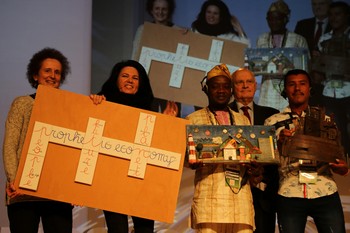 The first prize goes to the Peace Community of San Josè de Apartado, an association of Colombian ‘campesinos’ (farmers - the tr.) that has achieved a peaceful and respectful coexistence in the midst of a climate of great violence over the past two decades, without giving in to either drug trafficking or proposals to exploit the land with intensive cultivation of chemicals. The second prize goes to West Africa, to the Jevev association from Benin, which, starting from an invasive plant that was hindering movement along the river has created an opportunity for work and income for young people in the community, obtaining some fertilizing substances from it, too.
The first prize goes to the Peace Community of San Josè de Apartado, an association of Colombian ‘campesinos’ (farmers - the tr.) that has achieved a peaceful and respectful coexistence in the midst of a climate of great violence over the past two decades, without giving in to either drug trafficking or proposals to exploit the land with intensive cultivation of chemicals. The second prize goes to West Africa, to the Jevev association from Benin, which, starting from an invasive plant that was hindering movement along the river has created an opportunity for work and income for young people in the community, obtaining some fertilizing substances from it, too.
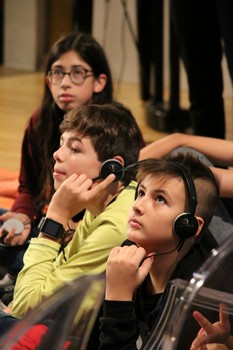 It's impossible to report on all the accompanying events. What remains is to introduce the organisers: an alliance between the Economy of Communion (the project of solidarity and fraternal economy founded by Chiara Lubich), Nomadelfia (the community founded by Fr. Zeno, which, in addition to its commitment to children, lives an interesting form of community economy and is now presided by the Paduan Francesco Matterazzo), the Global Climate Catholic Movement (a recent initiative launched by an international, qualified group of experts - and enthusiasts - promoting and directing the commitment of Catholics to climate), the Pope John XXIII Community (supporter, among other things, of the winning initiative of prophetic economy), the association Mondo di comunità e famiglia (World of Community and Family - the tr.), the Atd Quart monde, Slotmob (an association to combat gambling) and Teens for Unity (youth branch of the Focolare Movement), with a presence of the Banca etica (Ethical Bank - the tr.) and the Mutua autogestione (Mag) (Mutual Self-Management - the tr.) of Verona. So many voices expressing and shaping commitment and hope, for three days. (B. G.)
It's impossible to report on all the accompanying events. What remains is to introduce the organisers: an alliance between the Economy of Communion (the project of solidarity and fraternal economy founded by Chiara Lubich), Nomadelfia (the community founded by Fr. Zeno, which, in addition to its commitment to children, lives an interesting form of community economy and is now presided by the Paduan Francesco Matterazzo), the Global Climate Catholic Movement (a recent initiative launched by an international, qualified group of experts - and enthusiasts - promoting and directing the commitment of Catholics to climate), the Pope John XXIII Community (supporter, among other things, of the winning initiative of prophetic economy), the association Mondo di comunità e famiglia (World of Community and Family - the tr.), the Atd Quart monde, Slotmob (an association to combat gambling) and Teens for Unity (youth branch of the Focolare Movement), with a presence of the Banca etica (Ethical Bank - the tr.) and the Mutua autogestione (Mag) (Mutual Self-Management - the tr.) of Verona. So many voices expressing and shaping commitment and hope, for three days. (B. G.)


 «Ciao, Jeff!» That is how Luigi, perhaps 14 years old, opened his dialogue with the famous Jeffrey Sachs, professor at
«Ciao, Jeff!» That is how Luigi, perhaps 14 years old, opened his dialogue with the famous Jeffrey Sachs, professor at  Sachs, one of the most authoritative voices among those who believe in the importance of international aid, proposes a great reorientation of resources to respond to the most pressing problems of the planet. He cites the teaching of the popes, from
Sachs, one of the most authoritative voices among those who believe in the importance of international aid, proposes a great reorientation of resources to respond to the most pressing problems of the planet. He cites the teaching of the popes, from 

 During the conference the voices of supporters and operators of grass-root initiatives, starting from local resources and communities were also heard. No less interesting, and addressing the youngest ones, is the voice of
During the conference the voices of supporters and operators of grass-root initiatives, starting from local resources and communities were also heard. No less interesting, and addressing the youngest ones, is the voice of  The first prize goes to the
The first prize goes to the  It's impossible to report on all the accompanying events. What remains is to introduce the organisers: an alliance between the Economy of Communion (the project of solidarity and fraternal economy founded by Chiara Lubich), Nomadelfia (the community founded by Fr. Zeno, which, in addition to its commitment to children, lives an interesting form of community economy and is now presided by the Paduan Francesco Matterazzo), the Global Climate Catholic Movement (a recent initiative launched by an international, qualified group of experts - and enthusiasts - promoting and directing the commitment of Catholics to climate), the Pope John XXIII Community (supporter, among other things, of the winning initiative of prophetic economy), the association Mondo di comunità e famiglia (World of Community and Family - the tr.), the Atd Quart monde, Slotmob (an association to combat gambling) and Teens for Unity (youth branch of the Focolare Movement), with a presence of the Banca etica (Ethical Bank - the tr.) and the Mutua autogestione (Mag) (Mutual Self-Management - the tr.) of Verona. So many voices expressing and shaping commitment and hope, for three days. (B. G.)
It's impossible to report on all the accompanying events. What remains is to introduce the organisers: an alliance between the Economy of Communion (the project of solidarity and fraternal economy founded by Chiara Lubich), Nomadelfia (the community founded by Fr. Zeno, which, in addition to its commitment to children, lives an interesting form of community economy and is now presided by the Paduan Francesco Matterazzo), the Global Climate Catholic Movement (a recent initiative launched by an international, qualified group of experts - and enthusiasts - promoting and directing the commitment of Catholics to climate), the Pope John XXIII Community (supporter, among other things, of the winning initiative of prophetic economy), the association Mondo di comunità e famiglia (World of Community and Family - the tr.), the Atd Quart monde, Slotmob (an association to combat gambling) and Teens for Unity (youth branch of the Focolare Movement), with a presence of the Banca etica (Ethical Bank - the tr.) and the Mutua autogestione (Mag) (Mutual Self-Management - the tr.) of Verona. So many voices expressing and shaping commitment and hope, for three days. (B. G.)






